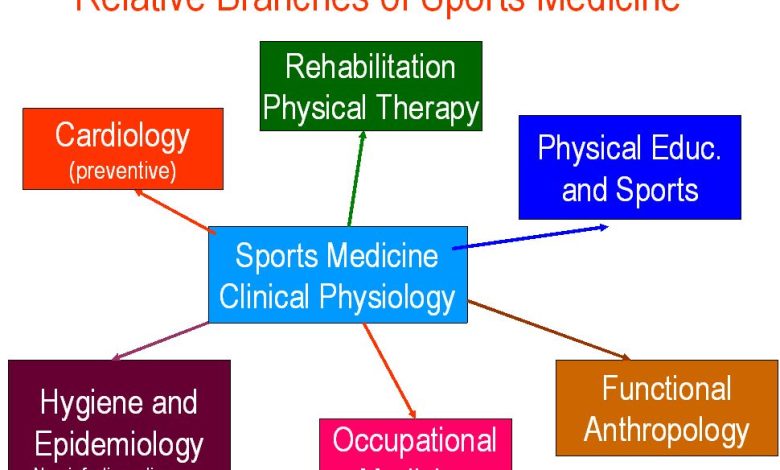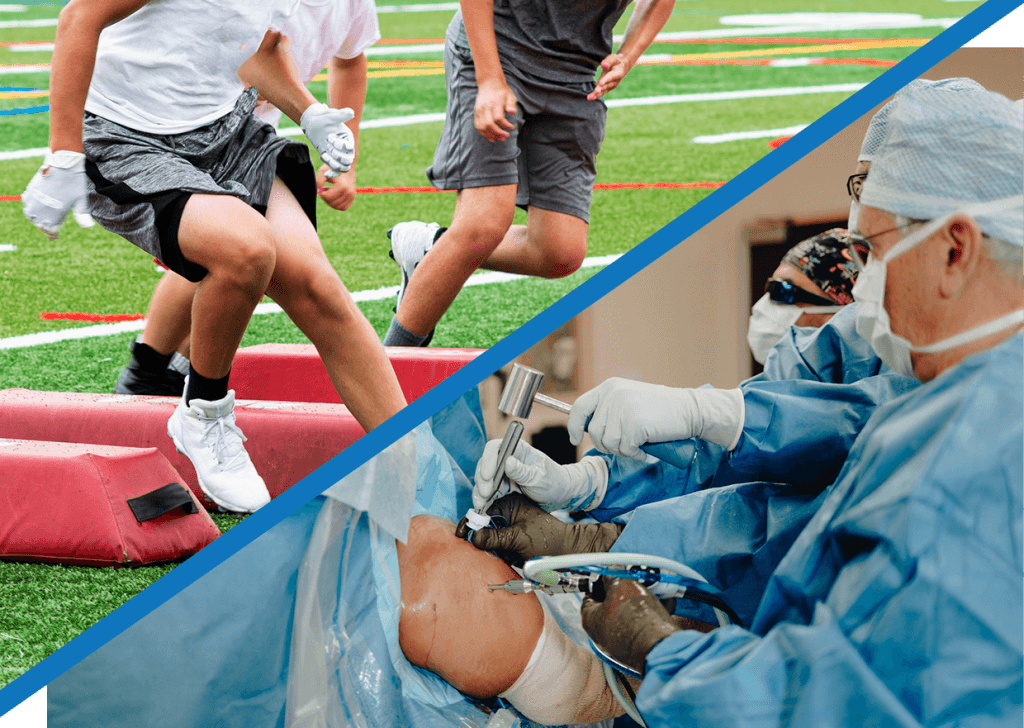Sports Medicine – Branch of Medicine: Enhancing Athletic Performance

Sports Medicine is a branch of medicine that focuses on physical fitness and the treatment of sports-related injuries. It aims to help athletes improve performance and recover from injuries.
Sports Medicine plays a crucial role in the world of athletics. It addresses various aspects of physical health, from injury prevention to rehabilitation. Specialists in this field work with athletes to enhance their performance and ensure they stay in peak condition.
This medical branch covers a wide range of activities, including exercise physiology, biomechanics, and nutrition. Sports Medicine professionals also collaborate with coaches and trainers to design effective training programs. Their expertise helps athletes stay at the top of their game and recover quickly from injuries. This holistic approach ensures overall well-being and peak performance.

Credit: www.drbillhefley.com
Introduction To Sports Medicine
Sports Medicine is a specialized branch of medicine. It focuses on physical fitness and the treatment of sports-related injuries. This field helps athletes perform at their best. It also ensures quick recovery from injuries.
History And Evolution
Sports Medicine has a rich history. Ancient civilizations understood the importance of physical fitness. Greeks and Romans trained athletes for Olympic Games. Over time, the field evolved with scientific advancements.
In the 20th century, sports medicine became more formal. It included specialized training and research. New techniques for injury treatment emerged. Today, sports medicine integrates modern technology with traditional practices.
Importance In Modern Athletics
Sports Medicine plays a crucial role in today’s sports world. It ensures athletes stay fit and healthy. It also helps them recover quickly from injuries. This field provides tailored treatment plans for each athlete.
Sports Medicine professionals work with coaches and trainers. They use advanced tools to monitor performance. They also teach athletes about injury prevention. This knowledge helps reduce the risk of future injuries.
Here are some key benefits of sports medicine:
- Improved athletic performance
- Faster recovery times
- Personalized treatment plans
- Reduced injury risk
Sports Medicine is essential for anyone involved in sports. It helps athletes achieve their goals safely and effectively.

Credit: drheckman.com
Injury Prevention And Management
Injury prevention and management is a crucial aspect of sports medicine. Athletes need proper care to avoid injuries and stay fit. This section discusses common sports injuries and their treatment and rehabilitation.
Common Sports Injuries
Athletes often face various injuries while playing. Common sports injuries include:
- Sprains and Strains: These are injuries to ligaments and muscles.
- Fractures: Broken bones due to impact or stress.
- Dislocations: Joints forced out of their normal position.
- Tendinitis: Inflammation of tendons caused by overuse.
- Concussions: Brain injuries from a blow to the head.
Treatment And Rehabilitation
Treatment and rehabilitation are vital after an injury. Here are the common steps:
- Initial Rest: Resting the injured area is crucial.
- Ice Application: Ice reduces swelling and pain.
- Compression: Using bandages to control swelling.
- Elevation: Keeping the injured area raised.
- Physical Therapy: Helps regain strength and mobility.
Physical therapy may include:
| Type | Description |
|---|---|
| Stretching Exercises | Improve flexibility and range of motion. |
| Strength Training | Builds muscle strength and endurance. |
| Balance Drills | Enhances coordination and stability. |
Proper injury management ensures a safe return to sports. Athletes should follow medical advice for effective recovery.
Enhancing Athletic Performance
Sports medicine plays a vital role in enhancing athletic performance. It combines training techniques and nutritional strategies to help athletes reach their peak. These methods optimize physical abilities and reduce the risk of injuries.
Training Techniques
Effective training techniques are essential for peak athletic performance. Athletes use various methods to improve strength, speed, and endurance.
- Strength Training: Increases muscle power and reduces injury risks.
- Interval Training: Boosts cardiovascular health and stamina.
- Plyometrics: Enhances explosive power and agility.
- Flexibility Exercises: Improve range of motion and prevent strains.
These techniques are tailored to the athlete’s specific sport. They focus on improving the skills needed for that sport. For example, runners might focus more on interval training, while gymnasts might prioritize flexibility exercises.
Nutritional Strategies
Nutrition is a cornerstone of sports performance. Athletes need balanced diets to fuel their bodies and recover efficiently.
| Nutrient | Role | Examples |
|---|---|---|
| Proteins | Repair and build muscle tissues | Chicken, fish, beans |
| Carbohydrates | Provide energy | Whole grains, fruits, vegetables |
| Fats | Essential for energy and cell function | Avocado, nuts, olive oil |
| Vitamins and Minerals | Support overall health and recovery | Leafy greens, dairy, nuts |
Proper hydration is also crucial. Athletes should drink water before, during, and after workouts. Sports drinks can help replenish electrolytes lost through sweat.
Some athletes may use supplements to enhance their diet. Always consult with a healthcare professional before starting any supplements.

Credit: www.vsortho.com
Future Of Sports Medicine
The future of sports medicine looks very exciting. Advancements in technology and emerging trends shape this field. Athletes can expect better care and quicker recovery times. This section explores these advancements and trends in detail.
Technological Advancements
Technological advancements in sports medicine are transforming athlete care. Devices like wearable sensors track performance in real-time. They monitor heart rate, speed, and movement patterns. This data helps doctors make better treatment plans.
Another exciting advancement is telemedicine. Athletes can now consult with specialists from anywhere. This reduces travel time and speeds up diagnosis and treatment.
Robotic surgery is also on the rise. It allows for precision in surgical procedures. This means shorter recovery times and less pain for athletes.
| Technology | Benefits |
|---|---|
| Wearable Sensors | Real-time performance tracking |
| Telemedicine | Remote consultations |
| Robotic Surgery | Precision and shorter recovery times |
Emerging Trends
Several emerging trends are influencing sports medicine. One significant trend is the use of regenerative medicine. This includes treatments like stem cell therapy. These treatments help heal injuries faster and more efficiently.
Another trend is personalized medicine. Doctors use genetic information to tailor treatments. This makes recovery more effective and faster.
The focus on mental health is also growing. Sports medicine now includes psychological support for athletes. This helps them cope with stress and improve performance.
- Regenerative Medicine: Faster healing
- Personalized Medicine: Tailored treatments
- Mental Health Support: Stress management
Frequently Asked Questions
What Is Sports Medicine?
Sports medicine focuses on treating and preventing sports-related injuries.
Why Is Sports Medicine Important?
It helps athletes recover faster and improve performance.
Who Can Benefit From Sports Medicine?
Athletes, active individuals, and anyone with exercise-related injuries.
What Treatments Are Used In Sports Medicine?
Treatments include physical therapy, medication, and sometimes surgery.
Conclusion
Sports medicine plays a crucial role in maintaining athletes’ health. It helps in injury prevention and recovery. This specialized field ensures peak performance and longevity in sports. Investing in sports medicine can lead to healthier, more resilient athletes. Stay proactive about your health and embrace the benefits of sports medicine.




